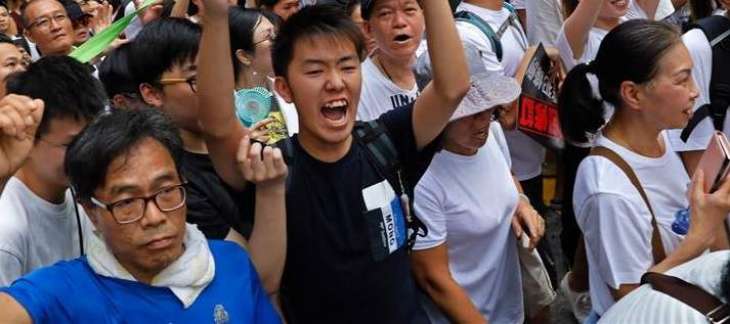Wilson was a five-year-old boy when Hong Kong was handed over from the United Kingdom to China in 1997, under an agreement pledging to offer the region considerable judicial independence and political freedom under the "one country, two systems" principle for at least 50 years until 2047
MOSCOW (Pakistan Point News / Sputnik - 11th June, 2019) Wilson was a five-year-old boy when Hong Kong was handed over from the United Kingdom to China in 1997, under an agreement pledging to offer the region considerable judicial independence and political freedom under the "one country, two systems" principle for at least 50 years until 2047.However, only 22 years after the handover of Hong Kong to China, Wilson joined an estimated of more than one million Hong Kongers to march in the streets on Sunday to protest against a controversial proposed extradition law, which could send locals to China to face criminal charges at Beijing's request.
"There's a growing sentiment of distrust among Hong Kongers against local authorities in Hong Kong and the central government in Beijing. Their anger against growing pressure from Beijing played an important role [in their decision to protest]. A number of cases took place in Hong Kong between the 'Umbrella Revolution' in 2014 and the protest on Sunday. In the eyes of Hong Kongers, the pressure from Beijing is enormous. I believe without the accumulated pressure from Beijing, the extradition law itself wouldn't attract so many people into the streets," Wilson, who declined to be quoted by his full name over fears of retribution from authorities, told Sputnik.
The Hong Kong native listed a number of such cases, including the extrajudicial detention by Chinese authorities of a book publisher who operated a bookstore in Hong Kong and the disqualification of pro-democracy legislators from the local parliament because of Beijing-backed revisions to local law.
The proposed extradition bill is widely viewed as part of Beijing's efforts to exert more control in Hong Kong, because it could allow locals to be extradited to face criminal charges in China where ruling Chinese Communist Party (CCP) often dictates how the law is being enforced.
Many protesters held banners saying "against sent to China" during the demonstrations in Hong Kong on Sunday.
"I felt deeply inspired during the protest, because it's been a long time since so many people came out together to march in the streets. This is one of the protests with the largest number of participants in the history of Hong Kong," Wilson said after taking part in the protests in Sunday.
He also plans to join other Hong Kongers to gather in front of the local legislative council at 11pm on Tuesday to continue to protest, after local authorities in Hong Kong refused to meet demands from the protesters and decided to move forward with the debate of the proposed bill on Wednesday.
Hong Kong legislature's president Andrew Leung told reporters on Tuesday that local lawmakers would have to vote on the controversial extradition bill by next Thursday.
Wilson, who works in the public sector, calls himself the first generation of Hong Kongers growing up under Chinese rule. But as he interacted more with Chinese from the mainland over the years, Wilson said he started to understand how different he is from the mainlanders culturally.
"I grew up in a family that rarely cared about politics. I believe many families in Hong Kong are very similar to mine and they just wanted to be obedient citizens. But as I grew older, I witnessed many social movements that focused on the identity of being a Hong Konger. They focused on protecting our 'collective memory' as Hong Kongers, such as the buildings from the colonial period and our own history. Many of my classmates and I began to identify ourselves as Hong Kongers, because the more we interacted with tourists from the mainland, the more we understood how much cultural difference there is. We enjoyed the relative freedom under British rule, while Chinese from the mainland were always under control. We began to discover our own identity much more," he said.
Similar to people from Taiwan, who are also ethnic Chinese, Wilson does not identify himself as the same as Chinese citizens of the People's Republic of China (PRC) under the CCP's rule.
"For people living in Hong Kong or Taiwan, we're not trying to differentiate ourselves on purpose because we're all ethnic Chinese. But we just don't trust the CCP's rule, after witnessing how dissidents, rights advocates, journalists or lawyers were treated on the mainland over the years. For Hong Kongers, we have been deeply influenced by the British democratic traditions. If Hong Kong will become just like any other city in China, we won't go down without a fight. We must defend our free values and our unique spirit as Hong Kongers," he said.
Wilson said he began to feel stronger about not being identified as a Chinese from the PRC after the massive protests in Hong Kong, known as the Umbrella Revolution, in 2014, when locals protested against Beijing's decision to introduce a selective pre-screening of candidates for the 2017 election of Hong Kong's top official.
This sentiment of a stronger Hong Kong identity during the Umbrella Revolution triggered grave concerns from authorities in Beijing, who viewed such ideas as separatism and responded by trying to assert more control in Hong Kong.
However, political analysts pointed out that Beijing's hardline response has triggered a vicious circle among Hong Kongers, who began to resist tighter grip from the central government.
"Beijing probably felt that even when it was not as heavy handed, movements like the Umbrella Revolution still emerged in Hong Kong and there was a stronger voice seeking independence. That's why Beijing wanted to step up its control. But the more pressure Beijing exerts, the more freedom Hong Kongers want to seek and avoid such control. This is an interaction and has become a vicious circle," Yen Chenshen, a researcher at the Institute of International relations, National Chengchi University in Taiwan, told Sputnik.
In an open letter calling on the public in Hong Kong to take action, organizers of the protests detailed the situation the region could face.
"Once Hong Kong totally forgoes democracy and descends into totalitarianism, what you enjoy now will eventually crumble or shall we say, it is crumbling into pieces NOW. Problems such as the ever-increasing cost of living and property prices will only get worse. Your YouTube channels, Instagram and Facebook accounts will no longer be uncensored but get banned anytime. The fortune that you earned with your bare hands may be frozen or confiscated with no legitimate reasons. Worse still, you may be silenced, or even 'vanished,' like those martyrs in China, one day," the letter said.
Civil rights advocates explained that Hong Kongers became increasingly concerned about the judicial independence and political freedom Beijing promised to protect under the "one country, two systems" principle.
"The recent development makes people in Hong Kong lose even more confidence on how we can maintain the 'one country, two systems.' There's no way that we can see any autonomy for Hong Kong to manage its issues," Patrick Poon, a Hong Kong-based PhD researcher at the University of Lyon and a China researcher with Amnesty International, told Sputnik.
The researcher argued that the firm stance from Hong Kong Chief Executive Carrie Lam on the controversial extradition bill is part of her efforts to prove to Beijing that she is capable of maintaining the heavy handed approach in the region.
"Of course, Carrie Lam claims it [the bill] has nothing to do with the mainland authorities. However, there's no justification on why this issue is so urgent or so imminent that the Hong Kong government needs to deal with it now. It's quite clear Beijing is behind this whole plan. Definitely, the Hong Kong government is just carrying out orders from Beijing authorities in order to exert more control in the city. Carrie Lam doesn't want to withdraw [the bill] in order to show her heavy-handed approach," he said.
Other political analysts pointed out that Hong Kongers protested because they wanted protect the exact "one country, two systems" arrangement which they feel is under threat.
"I think the promise is still there to be protected. HK people generally 'believe' in the One Country Two Systems promise, but they feel that the promise is being undermined, which is why they make their voice heard. The feeling of powerlessness also prompted so many to take action. HK people believe in the system, but just think that the very system is being undermined; the promise not maintained," Mathew Wong, a political science professor at the education University of Hong Kong, told Sputnik.
Because of the bad precedent of how the "one country, two systems" is being enforced in Hong Kong, Chinese authorities in Beijing might have to come up with a new term when negotiating with Taiwan in the future, Yen from National Chengchi University in Taiwan suggested.
"The kind of 'two systems' in Hong Kong has absolutely no market in Taiwan. The phrase 'one country, two systems' has lost its appeal. Beijing may not have understood this very well. They must come up with a new phrase to repackage the idea, because the existing phrase has a tainted image," he said.
Commenting on the protests in Hong Kong, Taiwan President Tsai Ing-wen vowed to never accept the "one country, two systems" arrangement as long as she is still in office.
"We stand with all freedom-loving people of #HongKong. In their faces, we see the longing for freedom, & are reminded that #Taiwan's hard-earned democracy must be guarded & renewed by every generation. As long as I'm President, 'one country, two systems' will never be an option," she said in a statement posted on her official Twitter account.
The Office of the Commissioner of the Ministry of Foreign Affairs of China in the Hong Kong Special Administrative Region issued a statement on Monday defending the enforcement of the "one country, two systems" arrangement in Hong Kong by arguing that the human rights conditions and rule of law improved greatly in the region after the handover in 1997.




